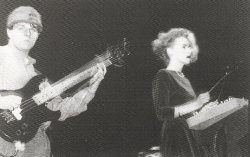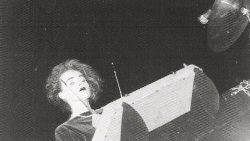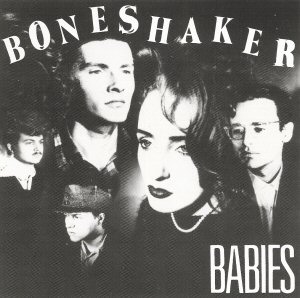| Articles de presse Dead Can Dance » 1984 |
 |
Dead Can Dance » Zig Zag - May 1984 Boneshaker Babies - May 1984 |
LET THE MUSIC FIND YOU
Dead Can Dance, at least the four members present, have eyes which echo this pacific blue room in almost surreal fashion. They are intense eyes; Eyes that pierce with utter conviction: Eyes that are indeed windows of the soul.
Dead Can Dance make SOUL music ñnot in the sense that it follows the particular genre that has come to be termed as such -not at all -but because their music truly moves; truly transcends the banal pretensions of others less adept through a simple, unremitting honesty ...because it truly expresses that burning desire. It really is in their eyes.
Here there is no hint of gratuitous ambition; only complete spiritual motivation: So I wonder how conscious they are of the progression of their music; how aware they are of the direction it takesĂ– Do they know what they are doing ? (and I fear this is far too vague and indirect a question).
 Lisa Gerrard (Vocals) : "It isn't indirect -it's quite an important question because it asks whether you are a complete slave to your work or to what you put forward: Whether you're prepared to give all of yourself and be manipulated by your creativity.
Lisa Gerrard (Vocals) : "It isn't indirect -it's quite an important question because it asks whether you are a complete slave to your work or to what you put forward: Whether you're prepared to give all of yourself and be manipulated by your creativity.ìNow if you do something and you let your influences direct you or stop you, then you're not being honest -I believe that you really have to be a SLAVE ñ just an instrument, because itĂs everywhere you go thereĂs music ñ thereĂs music outside now, and youĂre just really bringing those things forward through another language. You can give pleasure or receive pleasure from these things : just the rhythms of life, just that youĂre alive. Ă«Words fail her,îÖ itĂs important.
Ă®ItĂs like a storm, isnĂt it ? itĂs like falling in love or looking out of the window into a landscape which is so striking and natural and strong: It's just a STORM ñ itĂs just that, which is why you pursue it; because itĂs so mesmerising and so TRUEĂ®.
And is that what D-C-D are about?
Peter Ulrich (Drums, percussion): "As a philosophy of what we do -yes, but I think on a more practical level, if you're asking how the type of music develops; I see it as being to quite a large extent coming from the exploration of the instruments that we've got ñso rather than just writing songs that follow formulas that have gone in the past: standard rhythms; standard chord sequences -that sort of thing, we're exploring different ways of using those standard instruments (like the yang ch'in or Chinese dulcimer which Lisa plays), different types of percussion that we've been able to get our hands on from various places: Letting things different levels of sound." The search started in 1981 in Melbourne, Australia, though only Lisa and Brendan Perry (Vocals, Guitar) remain from that original line? up. In 1982, here In England, Peter Joined, followed last year by Scott Rodger (Bass, Not Talking In The Vicinity Of Microphones) with member.
As shown on their eponymous album, "Dead Can Dance" on 4.A.D. and their handful of dates, their music touches on a near-oriented sense of balance, both fluid and textured, it's a cascade of subtle extremes and lingering passion; the individual character of the sounds melting to create new and varied atmospheres: to explore shades of meaning; degrees of sensitivity. Often swopping instruments, their roles are not as clearly defined as I have made them seem: Their flexibility is one characteristic shared by precious few other bands. ..another is their whole attitude.
 LET THE MUSIC MOVE YOU
LET THE MUSIC MOVE YOUPerhaps, Brendan and Lisa agree, Melbourne's complacency and the stiffling routine of the gig circuit played it's part in their eventual move to England, but the reasons were less clear-cut and far more "irrational" than that: "Looking back, it's so hard to know why we came." Says Lisa, ". ..It was an adventure. ..you have all these perceptions of what it's going to be like because in Australia you have this idea that you're on this island floating out somewhere else in the universe and you hear all these things -all these colours of over here and you think: 'I just have to go' you know. You have this fabulous sort of desperation to go and see. ..."
SO would D.C.D. have continued had they remained in Australia?
Lisa: "Oh yes! It was inevitable what happened. The fact that Brendan and I stayed together and continued those first 12 months that we were here and we just went through so much trauma -I think it would have taken SO much to destroy our relationship in music. It was just so hard -it was all we had -if we didn't have IT ...Idon'tknow.. ."That first year in England when Brendan and Lisa had to live on a housing estate in Poplar which overlooked a chemical factory must have indeed seemed very bleak and Brendan agrees, "At least in that year of inactivity we had some sort of vision." When that Vision results in something as wonderous and breathtaking as "Threshold", then it's obvious that the object of their Vision is Emotion:
Peter: "My experience of talking to people or friends of mine who I've played our stuff to is that they do have some sort of emotional response to it. They don't just say 'Yeah, that was a good song' -they try and explain something that it made them feel."
Lisa: ". ..That it made them feel themselves. You know, people can become so numb to themselves; they become so lost and it's so wonderful if you can just help someone feel themselves -feel their own presence or the presence of the people around them. It's really so important -especially in big cities and environments where things are very harsh on the eye: they really need that: something to touch the senses.
"You do get so many people involved in music in these areas -you've always got some reggae or something coming from some flat somewhere and I think that they're the most important places for music to be -it really helps people." People become desensitized.
Lisa: "It's really sad -it's awful -you can help -you can share that through the music. If you can achieve that; if you can soften something or make them feel just a little bit of warmth or of life or faith or something, then you've achieved everything that you hoped to achieve."
So maybe music is an escape into reality?
Brendan: "A reflection of reality."
Lisa: "It's not an escape; it's what it really is; it's what's really there. I see what you're saying and what you're saying is true but you're not actually escaping: Where you are is just the wrong place. It's just you've blobbed in this sort of environment which is totally UNNATURAL to you, totally WRONG for you and music's just TRUE. ..it's just REAL. I think it makes you realise that the things around you are so WRONG, so WRONG and unbalanced for you -which is why people who have lived in an environment like that for a great length of time feel. ...They HATE music -they hear music and it doesn't matter how soft it is, but if it's music they'll COMPLAIN because it makes them see how wrong their own environment is for them and it becomes too mentally disturbing for them to cope with: They hear some music and it's like everything that they've lost is there calling them. ...It's terrible. ...It's tragic.
 LET THE MUSIC PLAY, PLAY ON.
LET THE MUSIC PLAY, PLAY ON.It's all very well seeing music in it's truest, purest form but, I put it to D.C.D., in order to allow their music to touch us all they have to, they must go through the shallow spirit-sapping machinery of the industry: Surely, this is the most meaningless and most unnatural environment for them in which to exist: They have been, they will be abused.
DCD agree -and disagree:
Peter: "There's an awful lot of that attitude but that doesn't make it intrinsic -all I'm saying is that hopefully we'll be able to find our way through and find places where we can work and people who we can work with who are sympathetic to what we're trying to do so that our eventual product, whether it's on record or live on stage or whatever is the best that we can offer."
As we discuss such matters Peter suggests that, because of the very natural nature of it's production, their music may be essentially different to that heard day in, day out on the radio. it begs the question: Could they ever conceive of being in such a situation themselves?
Lisa: "It's neither here nor there -you just purely and simply make music -what happens beyond that, as long as it's being shared with people for the right reasons and isn't being exploited. ...I don't think you can pollute the music itself if you're honest."
Brendan is more cautious; it seems to him that music played on day-time radio is unrealistic and cliched, the subject-matter predictably trival: It exists for no apparent reasons other than the overtly commercial, and, he concludes: "I think that the only way we'll be really accepted in popular music in terms of radio play is probably if the music does lend itself towards those popular, mainstream tastes, which I very much doubt it will do."
Lisa: "So you're saying that you've lost faith completely in the people: that they can't hear and relate to music anymore?"
Brendan: "No. ..no ...I'm saying that's why people's sensibilities are limited -because they regard music as a luxury."
Lisa: "And you don't think that if people heard say something of our's or of our friends that was just a simple little thing that's very nice and true that they wouldn't respond to that? Brendan: "Certainly they would respond ?there's always response but it's -like I can give you an example: A certain piece of music which we do, which I regard as a very beautiful piece of music, people who have that attitude will see it as frightening and doomy and gloomy, when in fact I don't see it as such. I ask myself why and I ask them why and they can't explain it."
There is, quite literally, Life beyond musical conditioning: All Dead Can Dance request are open hearts: Here there is beauty; Why shut ourselves away?